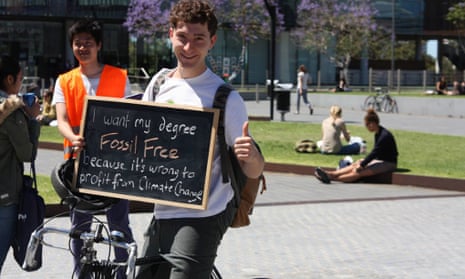The college which represents more than 21,000 medical practitioners and trainees in Australia and New Zealand has decided to divest from fossil fuels.
The Royal Australasian College of Physicians decision was announced on Wednesday, and will see it divest about £1.2m (A$2.3m) of fossil fuel interests from its £45m (A$90m) endowment. The RACP is Australasia’s largest specialist medical college.
The college said: “Since the RACP is a health organisation with an objective of improving the health of our population, divestment is an important action that leads to reduced carbon outputs and achievement of our health objective – to ensure better health outcomes for our patients into the future.”
Campaigners said the move will increase pressure on other health bodies, such as the Wellcome Trust and the Gates’ Foundation – the world’s biggest funders of medical research – to follow suit.
Charlie Wood, Australia campaigns director for the environmental NGO 350.org said: “In moving its own money out of fossil fuel companies, the college has sent a powerful message that investing in health means divesting from the industries that threaten it. The college’s leadership on this issue sets a laudable standard that other health organisations and professionals will now be compelled follow.”
In other news
Georgetown University (GU) in Washington DC announced on Thursday that it will remove the direct investments in its $1.4bn (£914m) from companies “whose principal business is mining coal for energy production”.
The working group from the university, which is the oldest Catholic and Jesuit university in the US, said that the investments were “an insubstantial portion” of the University’s endowment.
However representatives from GU Fossil Free on campus denied it was a victory stating: “It is evident that the university made its decisions for mostly financial and public relations reasons. If the board had made their decision for principally moral reasons, then they would have supported full divestment from both direct and commingled funds from coal, oil, and gas companies.”
In case you missed it ...
On Friday we published the third in our series on “carbon bombs”: it tells the story of the coal boom choking China. It’s seen as a poverty cure by many, but the coal dust brings disease, while drought and rising temperatures are helping to give rise to “environmental refugees” in huge numbers.
How China is choking under its carbon bomb. Amazing immersive piece by @lindsay_poulton and @_EmmaGH http://t.co/FoZ8pHcxRO
— James Randerson (@james_randerson) June 5, 2015
Today, Norway’s parliament is expected to confirm the biggest divestment commitment yet – namely to move its sovereign wealth fund out of coal-related investments. A new analysis of the $8bn move reveals it will affect 122 companies around the world, including Drax and SSE in the UK.
“Divestment is a rational approach. If you think your money can be used somewhere else, you should switch it”: these are not the words of a divestment campaigner, but of the former chairman of Shell, Sir Mark Moody-Stuart, speaking at a dinner by the Carbon Trust this week.
His surprise comments came as we revealed the cosy relationship between Shell and London’s Science Museum over its Shell-sponsored climate change exhibition, Atmosphere.
UN secretary general Ban Ki-moon gave the divestment fight a boost this week. Speaking in an interview with the Guardian, he stressed that governments need to invest in low carbon forms of energy.
Looking to South Africa might be a good place to start, as we revealed how clean energy from solar, wind and biomass is slowly stealing a march on coal across the country.
There are now less than six months to go before the doors open in Paris for COP21, the landmark conference where delegates from more than 190 countries will meet with the aim of agreeing a new global deal on climate change. Confused about what will be happening when and how it relates to previous conferences? Everything you need to know is here.
Did you see our recent investigative series on the companies that the Wellcome Trust and Gates’ Foundation are invested in and wonder how they came about? Then you might want to tune into the new episode of our podcast. In “the biggest story in the world” we hear the team come together with seven weeks to get their investigations into print.
Get involved
“We can’t divest from fossil fuels unless you tell us” – these were the words of the UK’s largest pension assets manager, Legal and General, last week. Meryam Omi was speaking at our Keep it in the Ground debate on divestment; you can still catch the highlights here.
Will you tell your pension fund you want to divest your money from fossil fuels? If you’re in the UK, you can use this special tool built for us by responsible investment charity ShareAction to email them directly. If your pension fund is outside the UK, sign up here to receive instructions.
Are you campaigning on climate change? Then we want to hear about it. Whether you’re demonstrating, boycotting, organising events or joining a local energy co-operative, we want to see your photos, stories and videos. Submit them to our assignment here.
Got a question or idea? You can still send them to us keep.it@theguardian.com

Comments (…)
Sign in or create your Guardian account to join the discussion